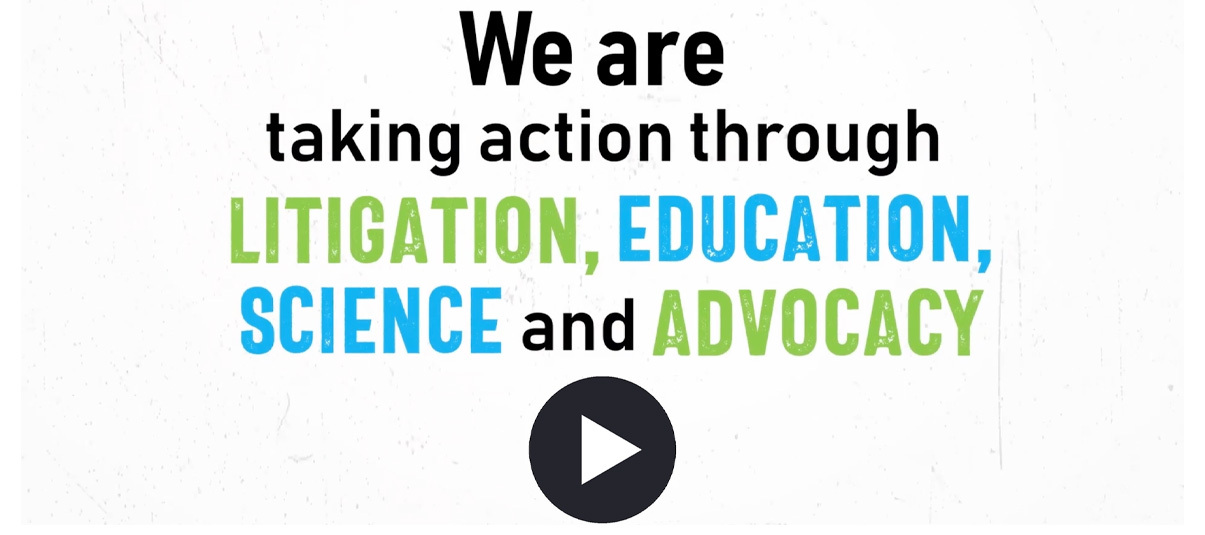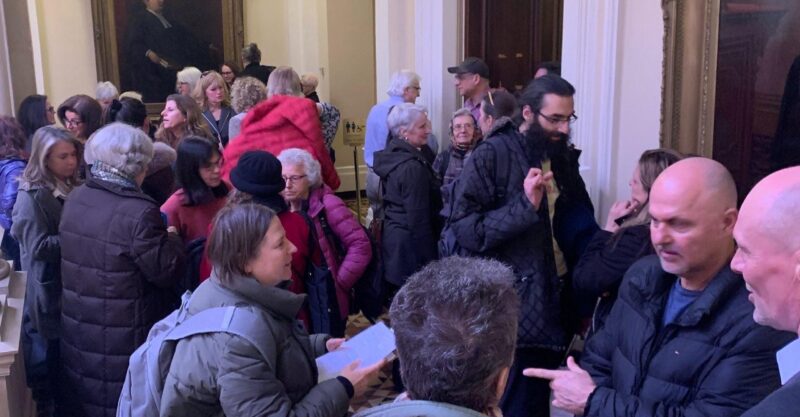Patients locked out of Court, unable to challenge medical regulator’s abuse of power
On March 30, 2023, in a packed courtroom with standing room only, the Divisional Court rejected a plea by approximately 100 patients of an Ontario doctor to challenge the unlawful action of the College of Physicians and Surgeons (CPSO) and the breach of their right to privacy under sections 7 and 8 of the Charter.
Origin of case
Lawyer for the patients, Rocco Galati, told the Court that the CPSO began an investigation against the patients’ family physician, Dr. Sonya Kustka for giving two child patients mask exemptions. It was triggered by a complaint from a Girl Guides Leader (who wishes to remain anonymous) that the girls stopped wearing masks at day camp after they presented a medical exemption letter signed by Dr. Kustka.
The CPSO’s interview notes of the Leader quoted by Mr. Galati in Court stated that she made the complaint because “members of the Polish and Eastern European community were looking for excuses to not wear masks”. The Leader, who knew nothing about the health or medical conditions of the girls, or about their family doctor, nevertheless speculated that the girls had no medical reason for not masking and their doctor was “selling mask exemptions” and was “unethical”.
Instead of dismissing the complaint because it was based on ethnic stereotyped generalizations, speculation, conjecture and prejudiced opinions, the CPSO used the racist complaint to investigate Dr. Kustka’s general medical practice regarding the COVID-19 pandemic and demanded release of all her patients’ medical records.
Paul Slansky, lawyer for Dr. Kustka stated that this was an abuse of power by the CPSO “to go on a fishing expedition of her patients’ personal and health information.” The children’s parents were outraged that the Girl Guides breached their daughters’ medical privacy by disclosing personal information without their knowledge or consent. They had asked Dr. Kustka not to give their daughters’ private information to anyone, including the CPSO.
When the CPSO placed restrictions on Dr. Kustka’s medical practice, forced her to post signs in her clinic stating that she was not allowed to give mask exemptions and threatened her with discipline for upholding her Oath to keep her patients’ information confidential, the parents commenced their legal challenge against the CPSO, joined by other patients.
Legal basis of case
Lawyers for Dr. Kustka and the Patients argued that the CPSO request for patient names, data, OHIP #s and personal health information must be authorized by law and based on actual evidence, not on speculation or stereotypes. This authorization requires “reasonable and probable grounds” to allege misconduct or incompetence by the doctor. The lawyers argued that neither was present. If the request for records is not lawful, then obtaining the records is a violation of their right to privacy protected under s. 7, and their right against unreasonable search and seizure under s. 8 of the Charter of their personal and health information.
Masking of school children is not evidence based
Masks were “recommended” for the first time in modern history in April 2020 without any evidence that they prevented risk of infection or transmission. It is also well known since COVID’s earliest days that the virus poses virtually no risk to schoolchildren. Still, the CPSO directed Ontario doctors to insist on child masking. However, the Cochrane Review published an authoritative study referred to as the “gold standard” in evidence-based medicine, which included results from 78 peer-reviewed Randomized Controlled Trials with over 6,000 participants, that there was no evidence of mask efficacy. Across the populations studied, masks, regardless of type, had made “little to no difference” in preventing COVID or flu. Yet the CPSO concluded that Dr. Kustka engaged in misconduct or was incompetent in giving the girls medical exemptions.
Exemptions for masks do not require evidence under Ontario Law
The lawyer for the Patients also told the Court that under Ontario Regulations, it is prohibited to require evidence for mask exemptions. The CPSO is not above the law and any decision it makes must be consistent with, not in conflict of, or contrary to the law. The Court ignored this position.
Double standard application of Charter rights
Without even hearing the Patients, and at the request of the CPSO, the Court ruled that the Patients are not even allowed to go to Court to review the CPSO demand. The doctor must produce their records including their names and personal data that have nothing to do with her clinical notes. The Court did not give reasons yet for the ruling, but suggested that patients cannot expect privacy, even in their own names and health information from the CPSO. This is a remarkable ruling, places CPSO above the law, and is contrary to over 40 years of jurisprudence from Canada’s highest Court, the Supreme Court of Canada. The law is that once an individual establishes what is referred to as “a reasonable expectation of privacy” then the individual has standing to assert rights under s. 8 of the Charter against unreasonable search and seizure. The right to privacy is also enshrined under s. 7 of the Charter as a component of “liberty” and “security of the person”.
A “reasonable expectation of privacy” exists in information that reveals any personal or biological information that one expects would be kept private and to remain safe from state scrutiny without consent. There are two components of the test. The first is subjective and will almost always be met, the second is objective and the focus is on the potential to reveal personal or biological information. It is hard to imagine information that is more personal, more biological and expected to be kept more private than health information or personal data. To provide a comparator of what the Ontario Court of Appeal recently held permitted an individual to have standing to assert Charter rights, an individual was determined to have a reasonable expectation of privacy in a conversation about a drug deal by text on a cellphone because it is the type of information one would make efforts to prevent being revealed.[1] If individuals have privacy interests in phones that must be protected from arbitrary state intrusion, then certainly patients should have a privacy interest in their own names and health information to be protected from arbitrary state intrusion.
Yet the Court found that patients did not have a direct, or, personal interest in their medical records, including in their own name because the CPSO was regulating a doctor, who possessed the files. This is also contrary to all established law. The Supreme Court of Canada has ruled that control of information is not lost just because another possesses it or can access it.[2] Even when an individual is deprived of exclusive control over his or her personal information, there is still a reasonable expectation of privacy to remain safe from state scrutiny. [3] With respect to health information, the Supreme Court of Canada has also ruled that a patient continues to have control over the information in medical records even after it is collected and in the hands of the doctor.[4]
The Divisional Court decision to refuse to even listen to the patients by denying them standing is not based on law, rather it is based on the Court’s own desire to throw COVID related cases out before they are even heard. This double standard in applying established constitutional law and principles is destroying the rule of law in Canada and will haunt Canadians and Courts for decades.
[1] R. v. Campbell, 2022 ONCA 666
[2] R. v. Marakah, 2017 SCC 59 para 41
[3] R. v. Mills, 2019 SCC 22
[4] McInerney v. MacDonald, 1992 CanLII 57

